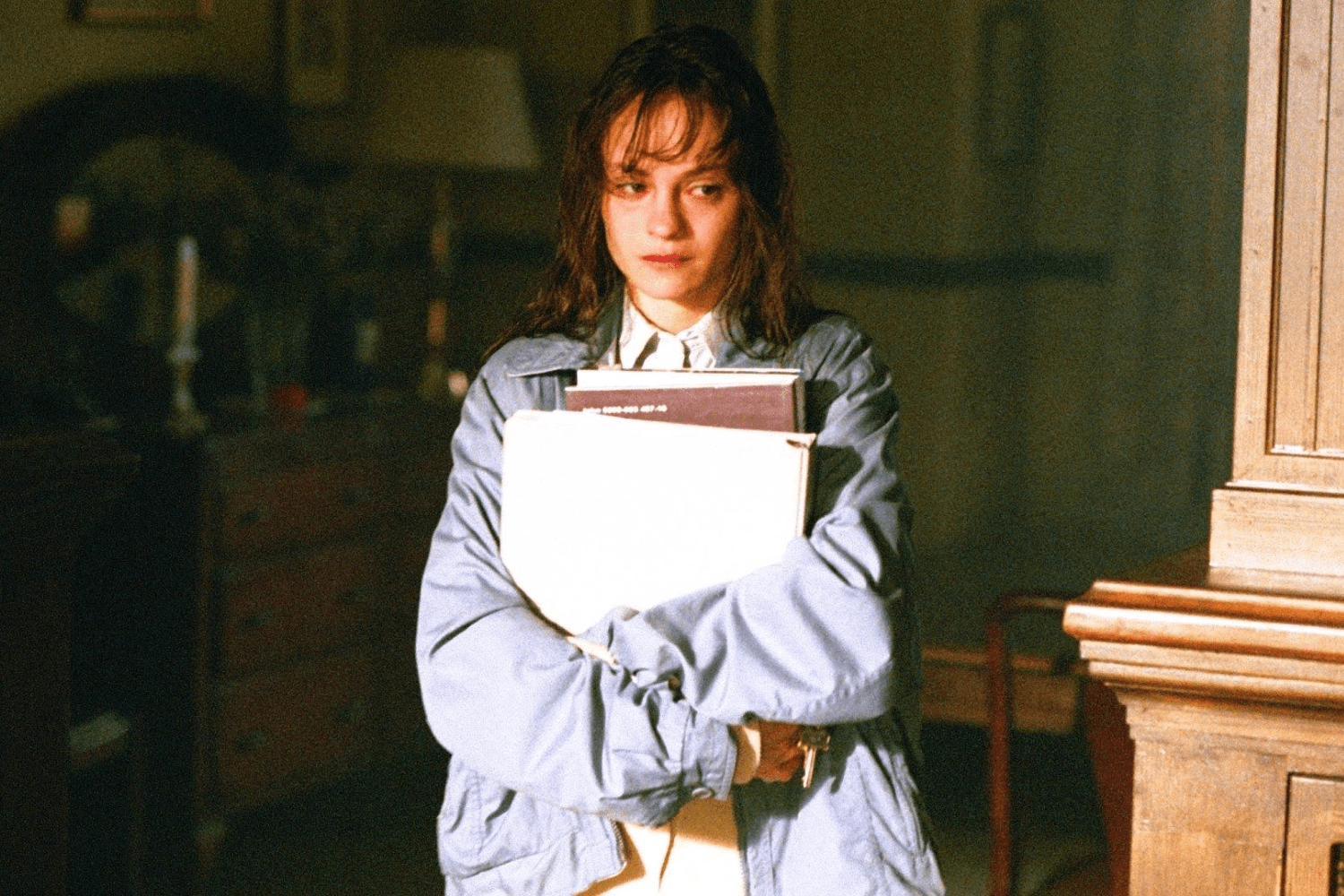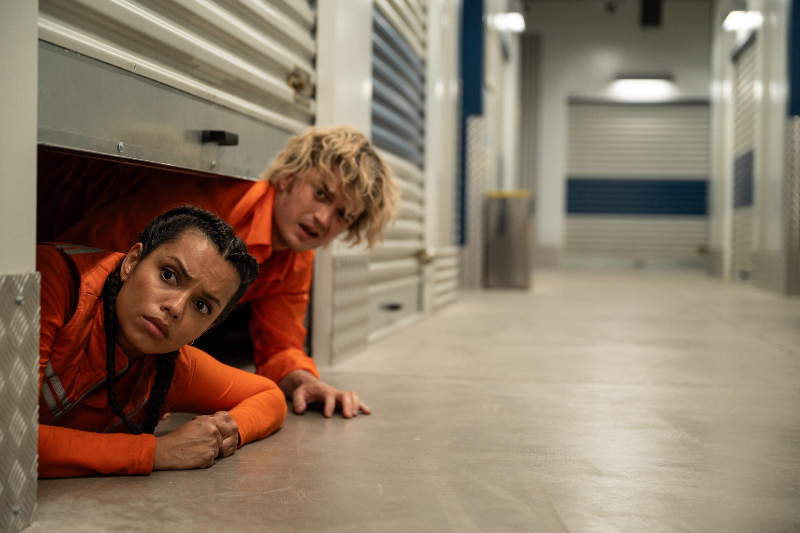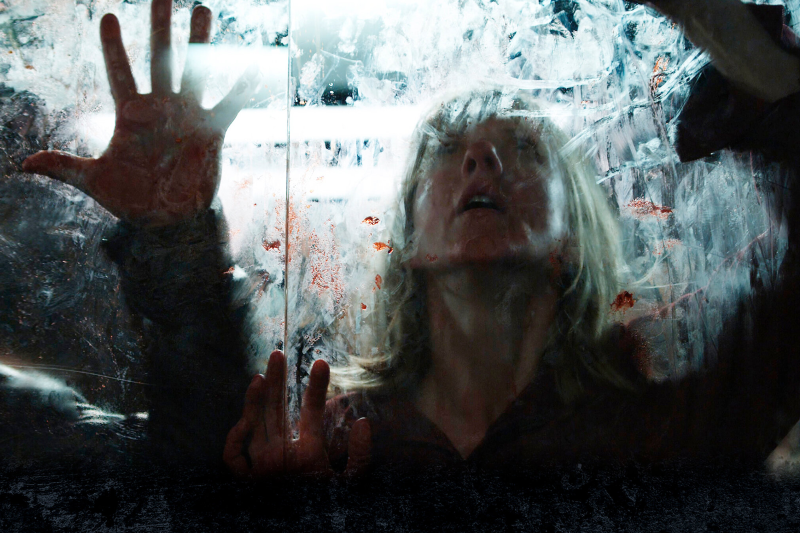In his 2002 Carrie adaptation, David Carson’s film opens with the titular Carrie White’s birth as asteroids rain down around her house. But when this made-for-TV movie aired to bombs of terrible critics reviews, it effectively blew out the studio’s plan for a spin-off show that could have taken the well-known story into fresh territory. Among the many accusations of not bringing anything new to the table alongside Brian De Palma’s bloodsoaked version from 1979, it was also accused of being boring. The San Francisco Chronicle wrote, “In the time it takes you to watch the remake, you could drive to the nearest video/DVD outlet, watch the original Carrie at home and return it — and still have an hour to spare.”
Not only are these reviews as mean as Carrie’s tampon-throwing tormentors, they don’t appear to have watched the same film I did. Nor did they identify the found-footage link to King’s source material left out of both De Palma’s and Kimberley Pierce’s versions.
Alongside the meteoric birth of Carrie White at the start of 2002’s Carrie, we have Detective Mulchaey (David Keith) as he films interviews with the handful of prom night survivors and those potentially involved in the fiasco that killed 234 people, leveling the gymnasium in fire, electricity, and blood. And as the adaptation flits back and forth between two weeks after the tragedy and the days in its lead-up, director Carson often opts for a handheld camera style that adds to the found-footage aspects of the narrative.
As an intellectual property so known by De Palma’s version, it’s easy to forget that Stephen King’s novel is partly found footage: the story is interspersed with police documents, newspaper clippings, hospital records, and more evidence about Carrie, her mother Margaret, and the town itself both before and after Carrie’s telekinetic rampage. This aspect immediately sets the 2002 version of the film apart from the others and adds a particular raw charm to the sometimes-forced performances that almost feel like a documentary rather than a movie.
For fans of the book, these style choices are effective and creepy. Angela Bettis’ sweaty, greasy and stringy-haired, baggy-eyed Carrie is very much as King describes on the page. The main difference is that Bettis is extremely skinny whereas King’s Carrie is chubby — another reason Chris Hargensen and Billy elect to douse her in pig blood. Importantly though, in the 2002 Carrie, Bettis’s version of the character remains plain even when dressed up for prom. This is a marked contrast to Sissy Spacek's version, who has the Hollywood ugly-girl transformation; Bryan Fuller’s screenplay even calls this out in his Carrie remake by referencing She’s All That, the Freddie Prinze Jr. vehicle where a model posing as an ugly girl merely hides behind a pair of glasses.
Also unlike De Palma's meek Carrie, Angela Bettis’ version has a current of rage simmering under the surface right from the beginning. We see it like a slap when Bettis’ Carrie finds her locker defaced with “PLUG IT UP” and an avalanche of tampons fall out in the main hallway. In this version, Carrie’s period shaming isn’t hidden in the girl’s locker room – it’s public. Bettis’ Carrie hits the mean girls with such a look of violent hatred that they are taken aback in fear. We see Sue Snell (Kandyse McClure) realize in real-time just what an awful thing they’ve done. It’s a shock when Spacek’s Carrie goes nuclear. But Bettis’ performance makes this Carrie a revenge story from the jump. Fuller’s screenplay also features a flashback demonstrating how Carrie’s power has been in play since she was a little girl, not a result of getting her period at 16 the way both King and De Palma’s versions tell it.
Another key difference between Carson’s Carrie and the rest is Patricia Clarkson’s stupendous portrayal of Carrie's mother, Margaret White. There are several types of abusers, but they tend to break down into two major groups: those who scream, yell, and physically act out, and those who quietly bake in their violence, filling a room with toxicity and erupting when you least expect it. Clarkson plays Mrs. White as the second type with chilling perfection. Gone are the histrionics and banshee wailing of Piper Laurie. Instead, Clarkson’s Mrs. White presents the venomous resignation of a woman who has lost her mind from trauma and takes her pain out on her equally disturbed daughter. Anyone who has experienced a quiet abuser might even be triggered by Clarkson’s portrayal in this film.
(The chemistry in this 2002 Carrie between Carrie and Margaret reminds me of Pearl and her mother in Ti West’s Pearl. Emotionally charged and painful. Beautifully grotesque performances. There’s a level of realism here that alone deserves giving this film another shot.)
And making Sue Snell one of the only Black students at Carrie’s high school — the only one of Carrie’s bullies to truly atone for her role in the torment — is an important casting choice that serves to highlight the multiple levels of white devilry at play here. This includes the bully classmates like Chris Hargesen (Emilie de Ravin), Carrie’s ultra-religious mother, and Carrie’s own ultimate rampage with its astronomical body count. Each of these white characters escapes accountability for their misdeeds even as their violence is well known. The principal of the school has a folder featuring 70+ acts of Chris’ violence against classmates. Carrie’s own neighbors witnessed her mother abusing her and did nothing. And by the end, we are rooting for Carrie even though she’s killed hundreds of innocent people, epitomizing the white antihero in a way other versions of this story didn’t extend.
Arguably, the most important change from De Palma and King’s versions is the alternate ending in which Carrie survives and rides off into the night with Sue, who plans to take her as far as Florida so she can begin again. While there have long been queer readings of the film, Fuller’s 2002 Carrie brings these queer undertones to the top through carefully placed jokes in the movie. It begins with Sue and Helen (Chelan Simmons) talking about rumors that Sue and Carrie are having a lesbian affair and that’s why she’s having Tommy take her to the prom. Sue jokingly responds, “It’s just that Carrie satisfies me in a way no one else can.” And then later, Carrie makes her only joke in the film to Helen after Tommy’s bestie compliments his tux: “If they decide to run away together, I’ll dance with you.” Adding to the queer-charged alternate ending is Sue finding Carrie drowned by her mother in the bathtub, and giving her mouth-to-mouth resuscitation: a kiss that brings Carrie back to life. This open queer coding by itself sets apart Carson's Carrie in a most welcome divergence.
Carson’s Carrie might have some pacing issues that cause the production to lag in places — the epic 150-minute runtime without commercials doesn’t help. But when you keep in mind this version was supposed to become a television series, it makes sense why certain unexpected characters get a lot of air time — they would have been key characters had the show been picked up. Which I wish it had been. Will Carrie heal, or will her rampages continue? Or something of both? Revisiting the 2002 Carrie remake now that it’s available on streaming platforms like Tubi and MGM+ shows how it both honors and extends King and De Palma’s visions of Carrie White in important ways that feel both timely, and timeless.






